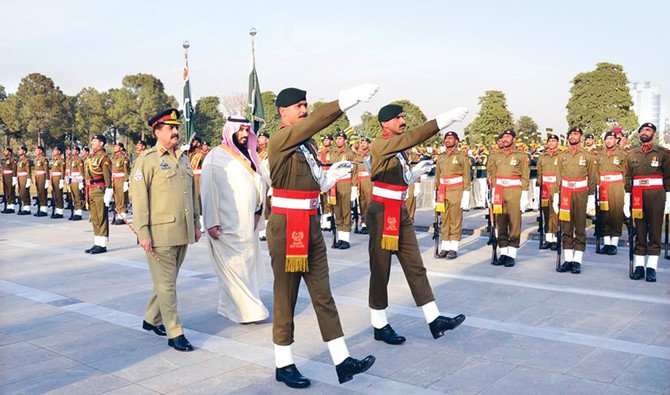Pakistan Army vows ‘to stand by Saudi brethren’

Defense cooperation between Islamabad and Riyadh has withstood the test of time, said Maj. Gen. Asif Ghafoor, head of the Pakistan army’s media wing.
“Pakistan is committed to standing by its Saudi brethren,” Ghafoor told Arab News.
Saudi Crown Prince Mohammed bin Salman signed a series of agreements to bolster investment in Pakistan with the Kingdom also planning to build a major oil refinery in the country.
Shah Mehmood Qureshi, Pakistan’s foreign minister, told Arab News that the investment initiatives proved that “strong ties (between the two countries) have been revived.”
He added: “Both countries also have strong security relations. If anyone would create chaos in or attack the Kingdom, Pakistan would stand by its brethren Saudi Arabia. We had been with the Kingdom in the past and we will stand by it in the future.”
Saudi Arabia and Pakistan have historically been close defense partners. Pakistan helped the Royal Saudi Air Force (RSAF) build and fly its first fighter jets. In 1969, Pakistan Air Force pilots flew the RSAF’s Lightning to thwart intrusions along the Kingdom’s southern border from south Yemen.
Over the next two decades, up to 15,000 Pakistani troops were posted in the Kingdom to strengthen security, and almost 13,000 troops and 6,000 advisers were stationed in Saudi Arabia until the Gulf War in 1991.
Under a 1982 protocol, cooperation was widened to include military training, defense production and sharing, and joint exercises. Pakistan’s armed forces have frequently taken part in joint military exercises inside Saudi Arabia.
Pakistan People’s Party Sen. Sehar Kamran, president of the Center for Pakistan and Gulf Studies, said that Pakistanis had always felt a special reverence for Saudi Arabia as the land where Islam was founded and developed.
“The leadership of Saudi Arabia and its government have been coordinating with Pakistan on many important issues, and share similarities on different regional and international matters,” she said.
Military cooperation had been mutual and not a one-way street, she added.
“Saudi Arabia sent its two naval ships to help Pakistan in its war against India 1971,” Kamran said. “The Kingdom has also unconditionally supported Pakistan’s stance on Kashmir.”
The Kingdom came to Pakistan’s aid in May 1998 — after it tested nuclear weapons — and promised to supply 50,000 barrels of free oil per day to help the country cope with likely economic sanctions.
Dr. Moonis Ahmar, a professor of international relations at Karachi University, said that Pakistan developed strong relations with Saudi Arabia during former prime minister Zulfiqar Ali Bhutto’s regime.
“During Gen. Zia-ul-Haq’s government military cooperation between the two countries strengthened further,” Ahmar said, adding that a Pakistan army division was deployed on Saudi Arabia’s request to reclaim the Grand Mosque in Makkah after insurgents seized it in November 1979.
Security analyst Imtiaz Gul said relations between Pakistan and Saudi Arabia were linked to the friendship between King Faisal and Bhutto. “These ties then extended to military cooperation,” he said.
The Saudis are indebted to Pakistan for the support it had extended to the royal family over the years, Gul said. Currently, Pakistan’s retired army chief, Gen. Raheel Sharif, commands a Saudi-led Islamic military alliance to fight terrorism.
“The Kingdom asking for Gen. Raheel to lead the Islamic military alliance is also a huge manifestation of its trust in Pakistan’s military,” he said.
In recent years, however, Pakistan has opted to stay out of a Saudi conflict with Yemen, adopting a policy of neutrality and non-intervention.
Kamran said while Pakistan had upheld its policy of non-intervention it was always ready to protect the holy land.
“Religious affinity, reverence for the two Holy Cities of Makkah and Madinah, a deep historical connection, as well as economic, social, and cultural bonds have united the people from these two lands in perpetuity,” she said.
“In spite of an evolving geopolitical and geostrategic landscape, the two have always been able to stand together on issues related to international peace and security.
“What sets this particular bilateral relationship apart is the absolute trust and mutual respect at heart, which has been an institutional policy of the state, irrespective of the government in power. Consequently, this all-weather friendship has withstood the test of time,” she said.
Courtesy : Arab News
